“It’s good to see you, brother.”
A big hug followed. One of my good friends, Don, had just returned from Las Vegas. We hadn’t seen each other in several months, but in the wake of the Las Vegas shooting earlier in the month, I made sure that I connected with him. You see, Don and his wife had been in the VIP section of the Route 91 Harvest music festival on October 1st, 2017, when Stephen Paddock indiscriminately opened fire into the crowd of over 20,000, killing 58 and injuring over 500 innocent Americans. And with a stark reminder that life is short and fragile being thrust into the limelight, I wanted to see my friend, make sure he was alright, and get his take on the evil events of that night.
By now, everyone seems to know about (and have an opinion on) the October 1st shooting in Las Vegas. We can armchair quarterback, throw around conspiracy theories, talk about gun control, and pointlessly argue back and forth, but the fact is what happened has happened. Many Americans lost their lives, and many others were injured. The discussion of what really happened and why it happened is important, but is not the focus of this article. Today, I’m writing so that we can look to the past as a guide to our future. As responsible gun owners, “sheepdogs,” and armed citizens, we have a duty to adapt and prepare to the burning world we live in.
I met with Don at a local Mexican restaurant. I know the restaurant’s owner from the gym, and they serve excellent food. After the chips and various sauces were brought out, but before our burritos arrived, Don pulled out his cell phone. As we began to talk about the particulars of the night, he wanted me to see a video that he had only shown one other person. The video was taken about an hour after the shooting broke out, and was a quick panoramic clip. And it was as horrific as I could have imagined. There were bodies laying in the open, some left by themselves and some with a few people huddled around them. There were still people running, jumping over obstacles, and the phone’s volume had to be turned down due to the screaming. Absolute evil and horror. The stakes and the stage for our conversation had been set.
Don is a firearms enthusiast, but also shoots competitively and trains regularly. He has experience owning a gun range, and has been an EMT for quite a few years. He’s got a sharp mind, and recounted the story of his experience in the shooting clearly:
Don and his wife were in the VIP section of the event, on the left side of the stage from the performer’s perspective. When the initial burst of gunfire rang out, Don’s wife remarked that the shots sounded like an AK47, and that a gang shooting must have been occurring just outside the concert. Videos from the event show that both Jason Aldean (performing) and the crowd had a delayed reaction, with many people insisting that the shots from Stephen Paddock’s rifles were fireworks. And then the second burst of fire came, and the world changed.
People were screaming, ducking, running, and desperately trying to find cover as 22,000 souls tried to pour out of the few exits they remembered. Don told me that within 30 seconds, a sort of autopilot kicked in. He yelled at his wife to get back to the hotel, and that he would be behind her. He recounted to me that her elbows and knees were extremely bruised for several days from the frantic pace she ran and dove behind whatever cover was available. Don then began trying to help nearby individuals, directing them towards exits and yelling at them to get to cover. Don vividly told me that as people were getting shot around him, he was compelled to try and help people get to safety. He told me that it felt like he “didn’t have a choice but to help.” At some point in the commotion, he saw a Las Vegas Metropolitan Police Officer get shot and drop to the ground by some cars. Now several minutes into the chaos, another group of police officers arrived, yelling at people to get out, get to cover, and clear the area. Don yelled to one of the officers, “You have a man down, officer down!” When the officer responded with another tape-loop command to get to safety, Don yelled again, “Man down! Man down!” At that point, Don ran over to the downed LVMPD officer, grabbed the drag handle on the officer’s vest and dragged him back from the cars as the other police officers rushed in to help. Elsewhere around the chaos, this scene was repeating itself over and over as heroic Americans rushed to help their fellow concert-goers. Somehow, the darkness seems to make the light shine brighter.
Both Don and his wife survived the incident. The next day in Vegas, Don recounted to me how they walked through one of the casinos on their way to the strip, and, like zombies, people were playing the gambling machines with glazed and empty eyes, drinking themselves into a state of delusion. In some ways, it was like nothing had happened. In other ways, the world had changed. Don told me that there were several trucks with “body scanners” being brought in by several of the large casinos. Yet the damage had been done. Beyond the gun-control arguments, beyond the conspiracy theories, Don’s wife felt, as she told him later, “resentment” towards him for leaving her as she got to safety on her own. They are in the process of attending counseling. Don threw himself into training harder, attending the local gun range’s “Action Shooting” night a few days later to polish his skills with a firearm and meeting with a personal trainer to improve his fitness. They aren’t out of the woods yet, but I am confident that with them both taking the steps to take care of one another, they will come out of this stronger than before.
“Never forget those that were killed, and never let rest those who killed them.”
What lessons should we take away from the horrific events in Las Vegas? Many, and it is not only something we should do, it is something we MUST do in order to be prepared for the burning world we live in today.
I asked Don what his biggest “tactical” takeaway was, and without hesitation he replied, “Always know where the nearest exits are.” Humans are creatures of habit, and we have a tendency to leave a place the same way we entered. This is a downfall in a chaotic situation where everyone is trying to leave an area in a hurry. As armed and alert citizens, being aware of the nearest exit is a simple and yet potentially life-saving mental exercise. Begin doing this as you go into buildings, and if feasible, practice leaving the building a different way than you entered.
Secondly, Don wasn’t drunk. He firmly believes that a large contributing factor of the chaos and clumsy evacuation was due to the fact that a large number of the concert-goers were intoxicated and/or high. While both he and his wife had enjoyed a few drinks, Don didn’t let himself get to the point of impairment, and when the situation at the festival changed, his mind was sharp enough to think clearly. When the safety of our loved ones is at stake, either at a concert or in daily life, the prepared and armed citizen has a duty to be mentally sharp. Human bodies are rather ineffective at most things in their natural state. We aren’t particularly fast, don’t have particularly good armor, and our hands are nowhere near as dangerous as, say, a Kodiak Grizzly’s claws. Our mental faculties have made us the apex predator on planet Earth, and when we impair those with alcohol or drugs, we lose that advantage. We should strive to maintain control of our minds at all times.
Sadly, for all of Don’s medical training, he did not have a single piece of medical equipment on him. No tourniquet, no pressure bandages, nothing. No, he wouldn’t have been able to save everyone. But if him or his wife had taken a round, that might have meant the difference between life and death. Like the airline safety briefings, you have to put on your own mask before you can help others. This event was a shocking wake-up call to Don with regards to carrying medical equipment EVERYWHERE we go. Personally, I carry a SOF-T tourniquet in my back pocket everywhere, and have a complete medical kit in my car with more tourniquets, pressure bandages, hemostatics, chest seals, and even bandaids. I will be expanding my on-body medical carry. Remember, if you carry a gun, you should carry medical equipment, because you are far more likely to use medical equipment than a firearm. Be realistic- you can’t save everyone, but you can help a loved one, or keep yourself in the fight.
Of course, medical gear, guns, and just about anything cool is useless without the knowledge of how to use it. I cannot emphasize the importance and value of training, good training, and consistent training in an event like this. Far too often, we get obsessed with the latest and greatest gadget. I get it, I’m a gun guy and I love getting new toys. Yet in matters of life and death we often will choose a hardware solution for a software problem. Instead of spending $200 on that fancy laser addition to your handgun, go take a basic concealed-carry class at a local range. It’ll do more for you than that laser ever will. A good tourniquet is only $20-$30, and you can get training ranging from basic first aid to Tactical Combat Casualty Care (TCCC), but the knowledge of how to use that tourniquet, or gauze, or chest seal is priceless. Seek out training, because you probably already have enough guns. Instead of spending $600 on the next gun, buy ammo and training. As an armed citizen, it is not only your responsibility, it is your duty to be prepared. This I cannot emphasize enough, as there are far too many gun owners who refuse to take training classes. I would argue that these people fail to meet the basic requirement for being a “sheepdog,” and barely qualify as “armed citizens.” An armed citizen not only has the firearms, but has the training to use them and mind to stay engaged in order to protect the freedom that others have shed blood for.
Along the lines of training, physical preparation is another vastly-overlooked skillset. The mind is our most powerful weapon, but the body is a close second. It is the chassis that carries everything else. If you are so out of shape that you need help breathing instead of helping others get to safety, you are actively making a bad situation worse. Don told me that he had gained nearly 40lbs over the last year, and he had some choice words for his physical condition. He is actively taking steps to change that- eating better, hiking more, and working out with some guidance from a personal trainer. You, dear reader, have the chance to improve your body BEFORE the fecal matter hits the rotating propeller. If you’re overweight, eat smaller portions and log your food intake. If you’re weak and deconditioned, lift weights and begin some light running. The tools to improve your “combat chassis,” as Pat MacNamara calls the body, are at your fingertips and are easily accessed. Don’t be the overweight gun-store commando who can’t get around the counter without being out of breath, and call yourself “prepared.” Focus, put in the work, and get stronger. There are many situations where being weak is a problem, but there are very few, if any, situations where being strong is a problem. Strength Coach Mark Rippetoe said it well when he said, “Strong people are harder to kill than weak people, and more useful in general.” Maybe harsh, but then again so is the world. Physically prepare.
For our LEOs, physical fitness, technical prowess, and mental alertness are more important than ever. Don’s perspective as a former first-responder and trained civilian was that technical prowess and physical fitness were important in the event, but also that LEOs should be aware of outside help. The few seconds of confusion between the LEOs hearing Don tell them that an officer had been shot, and the time Don dragged the officer out from the cars could have been the difference between life and death, but thankfully wasn’t. If you’re an LEO, train your body with weights, sprints, conditioning, and martial disciplines. But also train your mind with medical training, weapons skills, and stressful situations. Inoculate yourselves by going to training that puts you in a state of sensory overload, and then work through the problems to think clearly. Don’t let up on the training, because you are the rescuers, the defenders, and we are counting on you. A few days after the shooting, one of my LEO Facebook friends posted a picture of battle ropes, a tire, and a sledgehammer, with the caption, “Because the 32nd floor ain’t gonna come to you.” Legit.
Talk with your family about these events. The world is a cruel place, and America is in for a lot more evil in the future. While we must protect the innocence of the young, we must also prepare them to defend themselves. Talk with your spouse about your planned courses of action in various situations. The little conversations you have with your loved ones will serve you well if you are ever faced with a situation like the one in Vegas. They will also lend themselves well to fire-preparedness drills and other less-intense practices that every family should practice. Make sure you and your spouse are on the same page before traumatic events happen. Get ahead of the problems that Don and his wife are going to counseling for. It is YOUR responsibility and duty to be physically, mentally, emotionally, and spiritually prepared for the worst.
So go tell the people you love that they matter to you. Tell your friends how much they mean to you. Live every day to it’s fullest. Life is short, and when something beautiful is in front of you, cherish and pursue it. Let the evil events of Las Vegas serve to emphasize the light in our lives, and let that light be a fire that drives you to not only be a more prepared armed citizen, but also a better human. Don told me that he isn’t angry with the events of October 1st, 2017, and what has happened has happened. We can’t bring back the dead, but we can live in a way that honors them. We can learn from people like Don and others who have seen the face of evil and survived. We can prepare physically, mentally, emotionally, and spiritually. And we can love more fully, laugh more sincerely, and care more deeply. Don’t shy away from the responsibilities and duties of being an armed citizen in the United States.




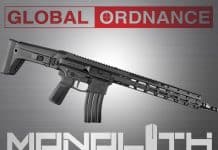
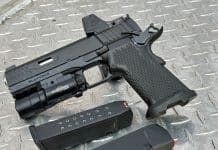
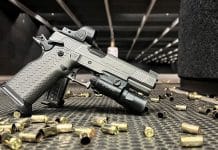

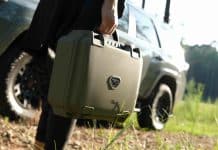
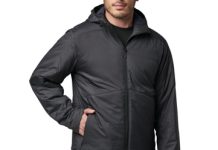
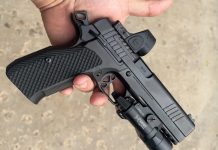
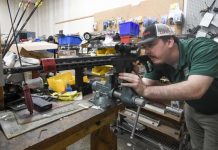


[…] becoming anything besides the routine you trained for. The days of adrenaline junkie dreams are a nightmare for those on the job. That being said, some careers can be incredibly rewarding both in the work […]
[…] “It’s good to see you, brother.” A big hug followed. One of my good friends, Don, had just returned from Las Vegas. We hadn’t seen each other in several months, but in the wake of the Las Vegas shooting earlier in the month, I made sure that I connected with him. You see, Don and his […] …read more […]